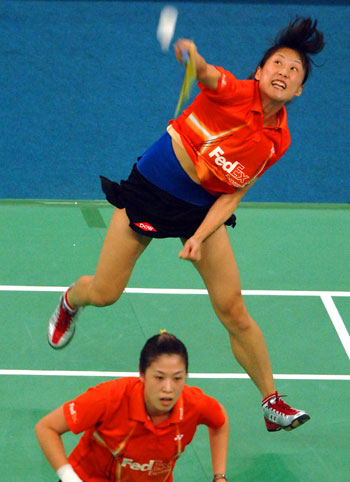How to live after badminton?
 0 Comment(s)
0 Comment(s) Print
Print E-mail China Daily, April 17, 2012
E-mail China Daily, April 17, 2012
Former world champ Dong Jiong says he understands Huang Sui's difficult decision
Everybody has to make a living somehow.
So Dong Jiong, China's world champion badminton player, said he fully understands former teammate Huang Sui's decision to represent Australia on the international stage after a four-year retirement.
 |
|
China's Huang Sui (top) and Gao Ling return a shot during women's doubles game at the World Badminton Championships in Kuala Lumpur on August 15, 2007. |
"I think she (went abroad to play for another country) because she wants to survive," Dong said after the launch of the Beijing division of the 2012 Red Bull amateur badminton tournament last Saturday. "It was a tough decision for her to make. As a world champion, nobody would want to leave home if they had a good job after retirement."
Though Dong doesn't know many details about Huang's decision, he said he believes she was left with little choice because her education was limited during her time as a player.
"Our state-run system (wasn't set up well to help athletes rejoin society) and learn other knowledge," Dong said. "It's improving, but the players remain incapable of finding a job after retirement."
Huang is not the first to change nationality after retiring from the Chinese team, but she is the most controversial thanks to her status as a local sports official before the move.
The 31-year-old retired in 2007 after claiming a doubles silver medal at the 2004 Athens Olympics with Gao Ling, and then was appointed as the deputy director of the Hunan provincial badminton administrative center.
She lost contact with the center and suddenly appeared on the Australian roster at a tournament in Sydney on April 4 after three years away from the post, during which her salary was still paid.
The center reportedly knew nothing about her move to Australia and has dismissed her.
Media criticized the three-year absences as a waste of taxpayer money and called for reform of the system, which offers players dispensable jobs in government after retirement.
Dong, who owns five amateur clubs, suggested fellow retired stars rely on themselves rather than the government.
"The first problem for retired players is to mentally recalibrate your position in society," the 38-year-old said. "Players have to face a series of problems, including a decline in public attention, decrease in income and loss of motivation, after retiring from sports. To accept an ordinary person's status is the key to starting over again in another field."
After winning a singles silver medal at the 1996 Atlanta Olympics, Dong retired in 2001 without any job offer or pension from his employer, the Beijing municipal sports bureau.
Rekindling his passion for cultivating the sport, Dong built up a franchise that includes five amateur clubs, and was hired as the head coach of China's Paralympic badminton team.
"I am lucky to carry on my legacy in the amateur arena," Dong said. "The country can't give every retired athlete ideal treatment. My fame only exists on the 100-square-meter court and won't last off it. I have to pick up new knowledge and regain my confidence again."
Coaching players with disabilities since 2009, Dong has focused his efforts on them at his clubs. He's spent money each year on improving the facilities while applying for an entry to the 2016 Paralympic Games.
Several athletes with disabilities will compete at the Red Bull tournament, which is supported by the national badminton administrative center.
The nationwide event swung off on April 7 in 129 cities with about 50,000 players. The competition is played in a best-of-three format, featuring men's singles, doubles and mixed doubles.
After four months of city and regional contests, the top two teams will slug it out in the London Olympics arena on Aug 6, the day after the badminton competition concludes.
"Amateurs with disabilities also deserve to enjoy professional guidance and the joy of the sport," Dong said.





